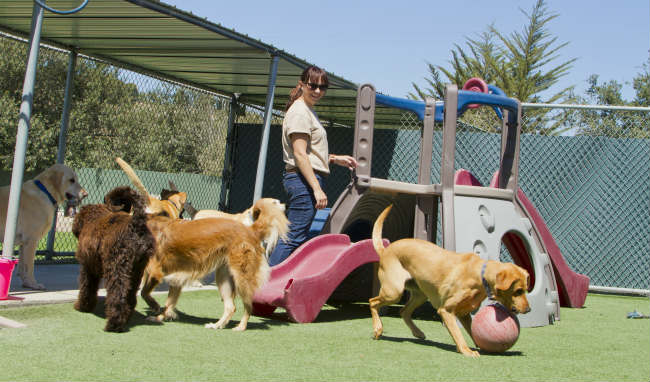
This post may contain affiliate links. We are compensated for referring customers to our affiliate partners.
Many dog owners feel terrible about putting their dogs into boarding kennels while they go on vacation. If this is how you feel, you probably worry about how homesick your pet will be, how much he will miss you, and how scared he will probably be among the strange dogs at the kennel.
You shouldn’t worry, though; at good boarding kennels, dogs get something they never do at home: an opportunity to socialize with other animals just like them. They play more, get lots of attention, a cozy little den to sleep in, and come back home as one happy and tired dog! The effect on your dog can be so positive, you might begin to consider regularly taking him to a kennel even when you don’t need to be away from home.
Many kennels are now offering doggie daycare services where dogs can safely socialize in a controlled environment around pets who have been vaccinated and temperament tested while under constant supervision.
Each time you take your pet in, you do need to make sure that he is ready for his holiday. While the new sights, sounds and smells of a pet boarding center can be exhilarating, they do need preparing for.
Make the boarding kennel as familiar an environment as possible
If you were sending a child to summer camp, you’d make sure when he arrived there that he’d have a few familiar things from home on hand to turn to for comfort at all times — a toy, a few well-loved snacks and so on. You can do the same thing for your pet when you send him to a boarding kennel. A few of his favorite toys, a bag of the brand of dog food that he prefers and a blanket that he finds comforting can all make your dog’s time at the boarding kennel as smooth as possible.
If the boarding facility offers doggie daycare sessions, consider taking your dog to the facility a couple of times just for the day. Once your dog is familiar with the facility, the other dogs, workers, and recognizes you come back – chances are your four legged friend will be excited upon your arrival.
Try to help your dog’s anxiety
If you’re anxious about how happy your dog will be at his boarding kennel, you’re likely to want to linger after you’ve dropped your pet off, to make sure that everything’s okay. It’s important to know, though, that your dog will quickly pick up on your anxiety. It’s a far better idea to look positive and make a quick departure after you drop your dog off.
There’s a lot more that you can do to keep your dog feeling positive. To begin, when you pack and make other preparations before the big day, you can go about your chores as quietly as possible. The more labored your actions, the more anxious your dog will become.
On the day that you are to take your dog to the kennel, you should set aside three or four hours right before the appointed time, and give your dog plenty of vigorous exercise. You want your dog to be tired and ready to crash. This way, he won’t be in the mood to fuss when he arrives at the kennel. When he wakes up after his long nap, his surroundings will already look familiar.
Make Your Goodbye QUICK!
If things go bad, it is often times attributed to the way the owner says goodbye. As a dog owner, leaving my dog for a few hours is torture, let alone days or weeks! It is not unusual for a pet parent to sob and cry when dropping off their furry friend. Leaving your dog while in this emotional state will often times cause the dog to be fearful and stressed.
Most dog owners have emotional goodbyes with their dogs for THEM and NOT for the dog! You have to be strong here. When you drop your dog off, give them a quick hug, say “be good”, and go on your way. Leave the crying for when you get back to the car!
Likewise, when you pick your dog up from the boarding facility, don’t be overly excited or emotional. Dogs are boarded all the time… It’s no big deal, right?! It’s only a big deal if you make it a big deal to your dog. As hard as it may be, try to save the more emotional hello’s and kisses for when you are already back home.
Watch what you feed your pet
When a dog is excited, it often tells on his digestive health. Finding himself in new surroundings, your dog might become so excited or otherwise agitated, he could begin to suffer from indigestion. Many dog owners make it worse by overfeeding their pets right before they take them to a kennel, channeling their love through food. This cannot be a good idea. If anything, you should feed your pet a little less than you usually do, to make sure that his tummy is in good shape.
Make sure that your pet is up-to-date on his vaccinations
Boarding kennels only accept fully vaccinated dogs. You can’t simply take your dog to the vet the day before the shots are due, and expect that the kennel will let your dog in. Since vaccinations can take several days to begin to become effective, most kennels require that all vaccinations be completed two weeks prior to a pet’s arrival. Usually, you need to take care of shots for parainfluenza, kennel cough, leptospirosis, distemper, parvovirus and hepatitis.
Make sure that your pet’s IDs are up to date
If you’re going away on vacation, the kennel may not be able to contact you in the event of a medical emergency. Even if they have your phone number, you might be out of reach just when you are needed. In such an event, up-to-date microchip or tag is your pets best bet. If you’ve changed phone numbers or moved since the last time your pet’s microchip was updated, you need to take your pet in to have it changed.
Put your pet through socialization training
One of the best parts of sending your dog to a boarding kennel is the opportunity for socialization that it comes with. As pets, dogs rarely have the opportunity to see other animals. To make sure that your pet doesn’t flip when he sees a bunch of strange new dogs when he arrives at the kennel, a refresher course in socialization training is usually a good idea prior to boarding. To make things even better, you can find a kennel that offers optional single-room boarding for pets. Your pet can have access to the peace and quiet of his own room for the first couple of days, until he finds himself more comfortable with his surroundings.
Finally, if you’re unsure about how well your pet will do in boarding, be sure to ask the staff at the end of his stay about how well he has done. If they seem concerned about specific areas of your pet’s behavior, you can always address them with training.
